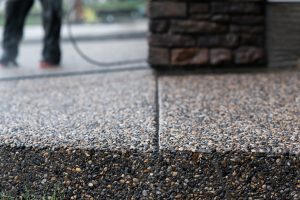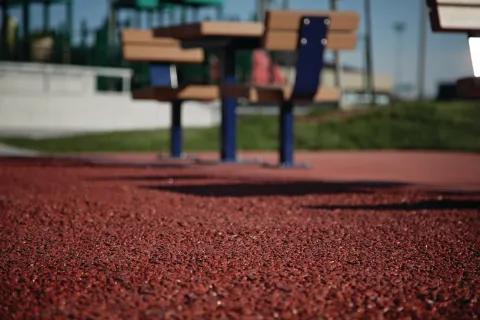We can start by explaining what the two terms really mean.
Cement is a general term used to refer to a binder, any kind of binder, which is used to hold tightly together other materials.
While concrete is a mixture of pastes and aggregates. These aggregates are a mix of sand, gravel and rocks. Water and cement are then added to this mix, the cement to bind the materials together, while the water helps to mix them and create a coarse paste. The paste is left to dry and harden. The product of this process is what is called concrete.
Hydraulic cement is the term used to describe any cement that makes use water to kick starts a chemical reaction between the compounds that make up the cement. The chemical reaction hardens the mixture, creating a water resistant product at the end of the reaction. The chemical reaction is not dependent on the water content of the various constituent materials of the mixture, this allows the material to be able to harden even used underwater. This particular feature of hydraulic cement makes it a very versatile construction material.
On the other hand Non-hydraulic cement makes use of materials that do not harden when exposed to water. In cost, non hydraulic cement is far cheaper than its hydraulic counterpart, but it has the downside of taking a very long time to dry and harden. Also, it cannot be used in wet environments, thereby making its practical, real life applications very small.
Cement has been in use for ages, but in modern days, Portland cement has been the cement of choice. Portland cement is made by grinding alumino silicate minerals and small bits of sintered limestone into very fine powder. What sets it apart from other cements is its fast drying time and the higher compression strength it packs.
Concrete on the other side is made of inert course materials such as gravel, recycled concrete, crushed stone, sand. The ratio of the materials is mostly dependent on the purpose of the concrete, that is, the kind of application it will be used for. Some of the benefits of concrete include its low maintenance, durability, energy efficiency, fire-resistance and environmental friendliness.
The struggle of concrete vs cement is not peculiar to laymen; even professionals mistake one for the other sometimes. For the sake of clarity, Cement is really an ingredient used in making concrete. The rock-like masses known as concrete are made by mixing the fine powder called cement with water, sand, and gravel or crushed stone.
1-800-CONCRETE is the source for ready mixed concrete for the construction industry. Whether you are a Do it yourselfer or a large concrete contractor we can assist you in finding concrete regardless of what city or state you construction project may be. Feel free to utilize our concrete calculator as well as our concrete locator above to better serve you in your next construction project. We know who the key concrete producers are in each of the top 100 local markets.
Let us help you take the guess work out of sourcing ready mixed concrete on your next concrete project whether the jobs is across town or across the country 1-800-CONCRETE will make sure you get the information you need to create value for your next construction project.
Ready Mixed Concrete which is made up of cement water sand and aggregates/stone has been a primary construction material for centuries. Ready mix concrete is used as a foundation material due to its strength and longevity. In addition to being used as a foundation material ready mix concrete is also used for concrete floors and driveways, parking lots, concrete countertops, curbs, and patios.

The appeal of exposed concrete lies in its raw, industrial aesthetic that brings a sense of modernity and authenticity to architectural design. Its sleek, minimalist appearance adds a contemporary edge to buildings, interior spaces, and outdoor landscapes alike. Exposed concrete showcases the inherent beauty of the material, with its subtle variations in color and texture providing visual interest and depth. Beyond its striking visual appeal, exposed concrete offers durability, low maintenance requirements, and versatility in design applications. Whether used in residential, commercial, or public settings, exposed concrete exudes a timeless elegance that continues to captivate designers, architects, and admirers worldwide
Get A Quote
• WeatherMix® does not contain calcium chloride or any other intentionally added chloride-containing ingredients.
o Excellent choice for concrete in contact with steel surfaces
• Will not initiate or promote corrosion of:
o Reinforcing steel embedded in concrete
o Galvanized steel floor and roof systems
• Exceeds industry standards for durability against freezing and thawing, offering:
o Superior workability
o Pumpability
o Placement with accelerated concrete setting times
• Controlled and predictable setting time leads to:
o Faster slab finishing
o Lower and predictable labor costs for contractors
We will respond to your request for concrete briefly. Look for updates via text message to your phone.
For immediate pricing and availability info, please call 1-800-CONCRETE.
Your Request
Quote #
Your Contact #
:test
Yards required
:12
Product Requested
:test
Delivery Date
:Monday, January 29, 2024
Thermedia is an innovative solution that enhances the insulation and energy efficiency of residential and office buildings, effectively reducing heat loss.
Our comprehensive lineup of Thermedia structural ready-mix concrete and screeds seamlessly blends robustness with thermal insulation, resulting in a remarkable 35% decrease in heat losses. By significantly reducing the thermal conductivity of concrete, we have achieved a remarkable factor of 5 reduction – from 1.6 W/mK for conventional concrete to an impressive 0.3 or 0.4 W/mK for thermally insulating concrete of equivalent strength. This remarkable improvement enables the attainment of leading international environmental certifications, such as LEED, BREEAM, and HQE, underscoring Thermedia’s commitment to advanced sustainability standards.



Hydromedia goes beyond being a mere product; it is a comprehensive water management system that efficiently absorbs rainwater from streets, parking surfaces, driveways, and walkways, thereby minimizing the risk of flooding.
By integrating the properties of concrete with advanced drainage technology, this permeable solution addresses the critical importance of water management. As the world’s most crucial resource, water necessitates careful handling to maximize its benefits while mitigating its negative impacts. Hydromedia facilitates the rapid removal of water, allowing it to infiltrate directly into the soil. This process contributes to the natural recharge of aquifers or enables water recycling. The diverse range of Hydromedia products is meticulously designed to cater to all your potential requirements, ranging from street pavements to roofing solutions.

ECOPact low-carbon concrete delivers 100% performance offering at least 30% lower CO2 emissions compared to standard (CEM I) concrete.
With ECOPact, we are committed to helping our customers reduce the footprint of their buildings and infrastructure to build better with less and decarbonize construction.
ECOPact has equal or better properties than conventional concrete.
It is available in a variety of strength classes and is compliant with industry standards.

ECOPact mix designs can be used in a variety of structural components: from foundations, columns and beams, to walls, driveways and walkways.
It can be easily handled, pumped and finished like conventional concrete.

Concrete is widely used in warehouse and distribution projects due to its durability, strength, and versatility. Here are some common applications of concrete in such projects:
Concrete is extensively used in multifamily projects due to its versatility, strength, and cost-effectiveness. Here are some common applications of concrete in multifamily construction:
Concrete plays a crucial role in infrastructure projects due to its strength, durability, and versatility. Here are some common applications of concrete in various types of infrastructure projects:
Concrete is widely used in Connecticut Department of Transportation (CT DOT) projects for various infrastructure components. Here are some common applications of concrete in CT DOT projects:

Adding a concrete pool deck to your home can increase its value in several ways:
Request a Quote on a new Pool Deck for your home.
Get A Quote - Now!
Concrete patios can indeed add both value and beauty to a home. Here are several ways in which concrete patios contribute to enhancing a property:
Overall, concrete patios provide a functional, durable, and aesthetically pleasing outdoor living space. They contribute to a home’s value by extending the usable square footage, enhancing curb appeal, and providing a long-lasting feature that requires minimal maintenance.
Concrete Driveways – Adding Value and Beauty to your home.
Adding a concrete foundation to your home offers several benefits, including:
How much do you need today?
Concrete is a composite material made primarily from cement, water, aggregates (such as sand and gravel), and sometimes additional additives. Here’s a breakdown of the main components:
1. Cement: The key ingredient in concrete is cement, which is a fine powder made by heating limestone and other materials at high temperatures. Cement acts as a binding agent that holds the other components together.
2. Water: Water is mixed with cement to initiate a chemical reaction called hydration. This reaction causes the cement to harden and bind with the aggregates, forming a solid mass.
3. Aggregates: Aggregates make up the bulk of concrete and provide its mechanical strength. They include materials such as sand, gravel, crushed stone, and recycled concrete. Aggregates fill the spaces between cement particles, giving concrete its stability.
4. Admixtures: Admixtures are optional additives that can be included in concrete to enhance specific properties or improve workability. They may include chemical compounds to accelerate or slow down the curing process, increase strength, improve durability, or provide other desired characteristics.
The proportions of these components vary depending on the desired strength, workability, and other specific requirements of the concrete. The proportions of these ingredients vary depending on the desired properties of the concrete. For example, concrete that will be exposed to water will need more cement and less water. Concrete that will be used in a high-traffic area will need more aggregates and less cement. The mixture is typically prepared by combining the dry components (cement, aggregates) and then gradually adding water while mixing until a homogeneous consistency is achieved.
This feature is coming soon…
